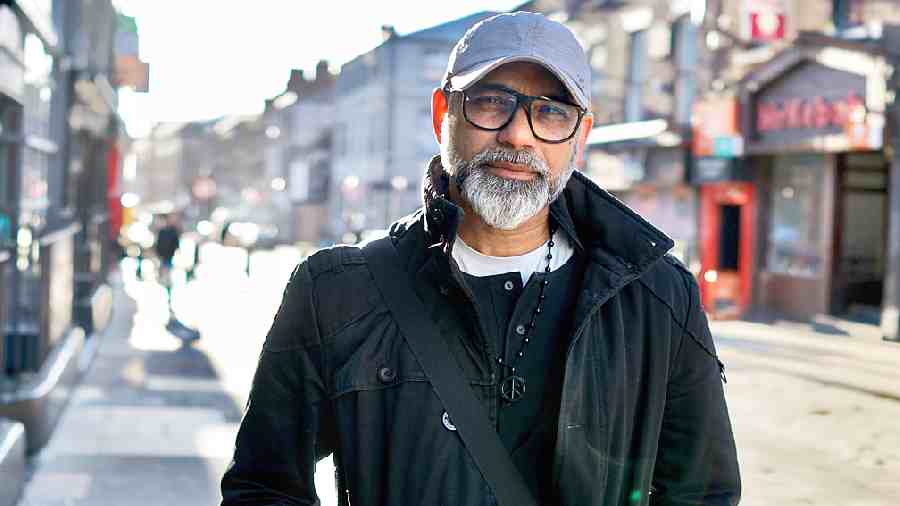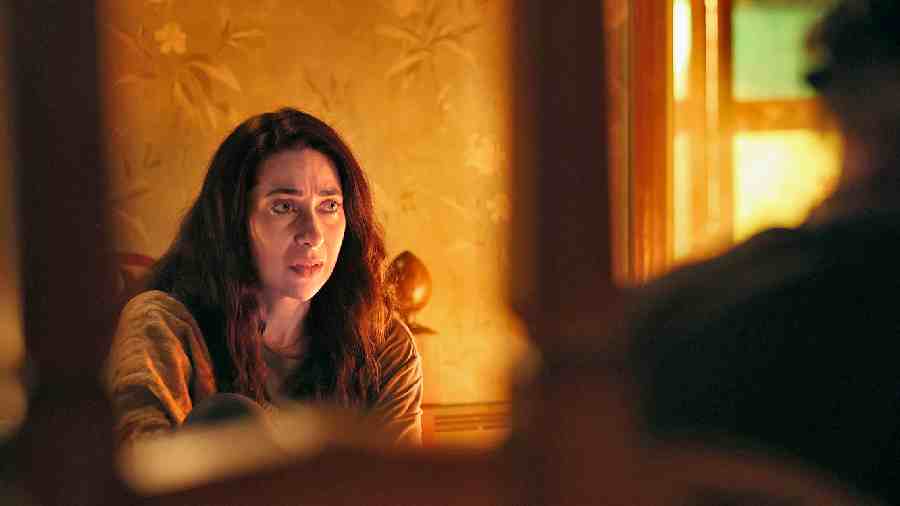Brown, that stars Karisma Kapoor as a world-weary cop and was shot extensively in Calcutta, has become the first Indian web series to be invited to the Berlin Market Selects section at the Berlin International Film Festival, to be held in February.
The Telegraph chatted with the show’s director Abhinay Deo — the man behind clutter-breaking cinema like Delhi Belly and seminal TV like 24 — to know more.
Brown is one of the first Indian web series to go to the Berlin International Film Festival. That’s a big one, isn’t it?
We are ecstatic about it! The series is very dear to my heart, and going to Berlin makes it even more special.
Is Brown’s selection at Berlin in a different category from that of Sonakshi Sinha’s web debut Dahaad?
It is a separate section. At Berlin, there is the awards section, for which the basic criterion is that the series has to be ready. Brown is being edited as we speak, and we could not really qualify for that category. But we had sent them two episodes, and they loved it so much that they included it in the Berlinale Series Market Selects section. This section is something that they do only by invitation. That’s a huge honour because there are only 16 from all across the world that they have selected, and Brown happens to be India’s first web series in Berlin Market Selects.
What was the idea behind Brown?
Zee Studios is producing it and they got it to me almost two years ago. It’s based on a book (City of Death by Abheek Barua). We took the book as the base and then we wrote our screenplay around it, and it evolved into something much more. There is, of course, a lot of difference between a book and a series. We started writing two years ago and then last year, we shot the show. I was in Calcutta for almost a month, shooting the entire series.
Brown is a murder mystery on the surface, but it’s essentially a story about people. I selected Calcutta as a city because I personally feel that it’s a rare city in this country which is very different from the rest of the metros. It has so many different cultures — there are AngloIndians, Marwaris, Bengalis, Biharis....
At the same time, it is one of those cities which is a metro, but has, on many levels, retained its heart. The minute a city becomes huge, whether it is in India or any other part of the world, it loses its DNA. I hope that Calcutta never loses its DNA. There is so much of character in the city that I felt I would be able to do full justice to a series which is all about varied people and their emotional baggage and the backstories that each one of these characters carries. That ended up exciting me a lot more.
Apart from the fact that it’s a neonoir thriller, there is not much information about Brown on the Internet. Kolkata has been a favourite location for recent films in this genre, from Kahaani to Detective Byomkesh Bakshy! to T3EN. Did that factor also make you choose the city for Brown?
Neo-noir thriller is an apt description of Brown, but it doesn’t describe it fully. It’s a neo-noir thriller with a very in-depth focus on human nature. How one’s emotional baggage of the past impacts one’s present life. Not much has been written about the series so far by design because at the end of the day, it’s a thriller with a murder mystery and we didn’t want to give away anything so soon.
You are right when you say that a series of this genre sits perfectly with Calcutta. In Brown, the city functions as a character on its own. The underbelly of the city is quite interesting... at times it’s dangerous, at times it’s shockingly different from that of other cities in the country.

Abhinay Deo
Karisma Kapoor, I feel, is an underrated and under-utilised actor and when she acted in the ‘90s, women on screen didn’t have much agency, if at all. What made you opt for her as your protagonist?
Precisely what you said! She definitely is a very under-utilised character. Also, she has always played extremely glamorous roles. Brown has her in a part which is diametrically opposite to any glam role that she has ever played. I wanted to challenge an actor like her in a role which she has never played, which she has never looked at.
She plays an Anglo-Indian character in the film, and she kind of fits the bill when it comes to the look. She is a very good actor and I have put her in an area of discomfort, in terms of something she hasn’t played before. It’s a totally de-glamourised role, she plays a cop, she has a lot of baggage.... The role immediately breaks her image of the past and brings her into a zone that people have never seen her in. That is very exciting for me as a director.
Was Brown always meant to be a series? Did you ever think of turning it into a film?
Yes, it was always meant to be a series. It would have been very difficult to bind the source material into a couple of hours if we made it into a film. Making it into a series gives us the opportunity to really play out all the character arcs, all the different shades of the city and all the different shades of the diverse cultures dwelling in the city.
You directed 24, the Indian adaptation of the extremely popular American series of the same name, with Anil Kapoor stepping into the shoes of Kiefer Sutherland. That released on television in 2013, with a second season following in 2016, and met with praise. Streaming platforms hadn’t made their presence felt then. Do you, at any point, feel that had you made it now, the show would have become much bigger than what it was?
I certainly feel that 24 was meant to be on an OTT platform. It would certainly have grabbed more accolades if it was streaming right now. Having said that, when it premiered on television, it was very well received. It was a clutter breaker. When the first season released in 2013, we had no clue that the streaming platforms were coming in and that they would become so big. For us, the idea of making 24 was that it would push the envelope on television. That it would upgrade our TV content, and it did that, to some extent.
But now, streaming platforms give us the freedom to tell stories the way we want to tell them. It’s hugely beneficial to all of us because it makes the telling of diverse stories and formats possible. Earlier, all we had was either film or TV, and there was a huge disparity between the two. Right now, it’s a great thing that there is something in the middle, which gives you the right money and the right creative freedom and the time to make it. Earlier, a story had to be crushed into two hours to make it into a feature film or it had to be stretched like a rubber band for it to be on television. Now we can do justice to the story that we want to tell.
Which reminds me that you made Delhi Belly back in 2011 and that was the mother of all clutter breaking content...
It was, it was (smiles). That’s pretty much been my modus operandi... to break the clutter as much as I can, and give the audience something new every time by pushing the envelope.











